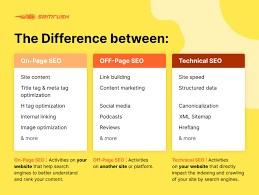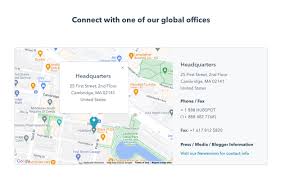The Difference Between On-Page SEO and Off-Page SEO
Search Engine Optimization (SEO) is a crucial aspect of digital marketing that helps websites rank higher in search engine results pages. There are two main categories of SEO: On-Page SEO and Off-Page SEO, each playing a vital role in improving a website’s visibility and online presence.
On-Page SEO
On-Page SEO refers to the optimization strategies that are implemented directly on a website to enhance its search engine rankings. This includes factors such as optimizing meta tags, headings, content, images, and internal linking structure. By focusing on on-page elements, website owners can improve the relevance and quality of their content for both users and search engines.
Key elements of On-Page SEO include:
- Keyword research and optimization
- Optimizing meta titles and descriptions
- Creating high-quality, relevant content
- Improving website loading speed and mobile-friendliness
- Optimizing internal linking structure
Off-Page SEO
Off-Page SEO focuses on external factors that impact a website’s search engine rankings. This includes building backlinks from reputable websites, social media engagement, online reputation management, and other external signals that indicate the credibility and authority of a website. Off-page SEO helps search engines understand the popularity and relevance of a website within its industry or niche.
Key elements of Off-Page SEO include:
- Building high-quality backlinks from authoritative websites
- Social media marketing and engagement
- Online reviews and reputation management
- Guest blogging and influencer partnerships
- Social bookmarking and directory submissions
The Importance of Both On-Page and Off-Page SEO
In order to achieve optimal results in search engine rankings, it is essential to focus on both on-page and off-page SEO strategies. While on-page SEO ensures that your website is technically sound and provides valuable content to users, off-page SEO helps establish your website’s authority and credibility across the web.
By implementing a comprehensive approach that combines both on-page and off-page optimization techniques, website owners can improve their chances of ranking higher in search engine results pages and attracting organic traffic to their site.
Mastering SEO: Essential On-Page and Off-Page Strategies for Success
- 1. Create high-quality, relevant content for your website.
- 4. Use descriptive URLs and internal linking to improve site structure.
- 5. Optimise images with alt text and compress them for faster loading times.
- 6. Regularly update and refresh content to keep it relevant and engaging.
- 1. Build quality backlinks from reputable websites related to your industry.
- 5. Monitor and manage online reviews and reputation to build trust with users.
1. Create high-quality, relevant content for your website.
Creating high-quality, relevant content for your website is a fundamental tip in both On-Page SEO and Off-Page SEO strategies. By developing content that is informative, engaging, and tailored to meet the needs of your target audience, you not only improve the user experience on your site but also enhance its credibility and authority in the eyes of search engines. High-quality content that addresses key topics and provides valuable insights can attract organic traffic, encourage social sharing, and earn backlinks from other reputable sites – all of which are essential elements for boosting your website’s visibility and ranking in search results.
4. Use descriptive URLs and internal linking to improve site structure.
Utilising descriptive URLs and implementing effective internal linking are fundamental strategies in enhancing site structure for both on-page and off-page SEO. By crafting clear and concise URLs that accurately reflect the content of each page, website owners can improve user experience and help search engines better understand the context of the content. Additionally, strategic internal linking not only aids in guiding visitors to relevant pages within the site but also distributes link equity throughout the website, boosting overall visibility and authority. These tactics work hand in hand to strengthen a website’s architecture, ultimately contributing to improved search engine rankings and user engagement.
5. Optimise images with alt text and compress them for faster loading times.
When focusing on On-Page SEO, it is crucial to optimise images by adding descriptive alt text that helps search engines understand the content of the images. Additionally, compressing images is essential for faster loading times, which not only improves user experience but also positively impacts SEO rankings. By implementing these image optimisation techniques, website owners can enhance their on-page SEO efforts and contribute to a more efficient and user-friendly website experience. Off-Page SEO can also benefit indirectly from faster loading times as it can improve overall website performance and user engagement, further boosting the site’s credibility and authority in the eyes of search engines.
6. Regularly update and refresh content to keep it relevant and engaging.
Regularly updating and refreshing content is a crucial aspect of both on-page and off-page SEO strategies. By keeping your website’s content current, informative, and engaging, you not only provide value to your audience but also signal to search engines that your site is active and relevant. Fresh content can attract more visitors, encourage repeat visits, and improve your site’s search engine rankings. Whether it’s updating blog posts, adding new information to product pages, or refreshing meta descriptions, maintaining a consistent schedule of content updates is key to staying competitive in the online landscape.
1. Build quality backlinks from reputable websites related to your industry.
To enhance your website’s search engine visibility, a crucial tip is to focus on building quality backlinks from reputable websites that are relevant to your industry. By establishing these strong connections with authoritative sites in your niche, you not only increase your website’s credibility and authority but also signal to search engines the relevance and value of your content. Quality backlinks serve as a vote of confidence for your website, helping to improve its ranking in search engine results pages and drive organic traffic to your site.
5. Monitor and manage online reviews and reputation to build trust with users.
Monitoring and managing online reviews and reputation is a crucial aspect of both on-page and off-page SEO strategies. By actively engaging with user feedback and addressing any concerns or issues promptly, website owners can build trust with their audience and enhance their online reputation. Positive reviews not only contribute to a website’s credibility but also signal to search engines that the site is trustworthy and provides valuable content. In today’s digital landscape, where user-generated content holds significant influence, maintaining a positive online reputation is key to attracting and retaining users.




